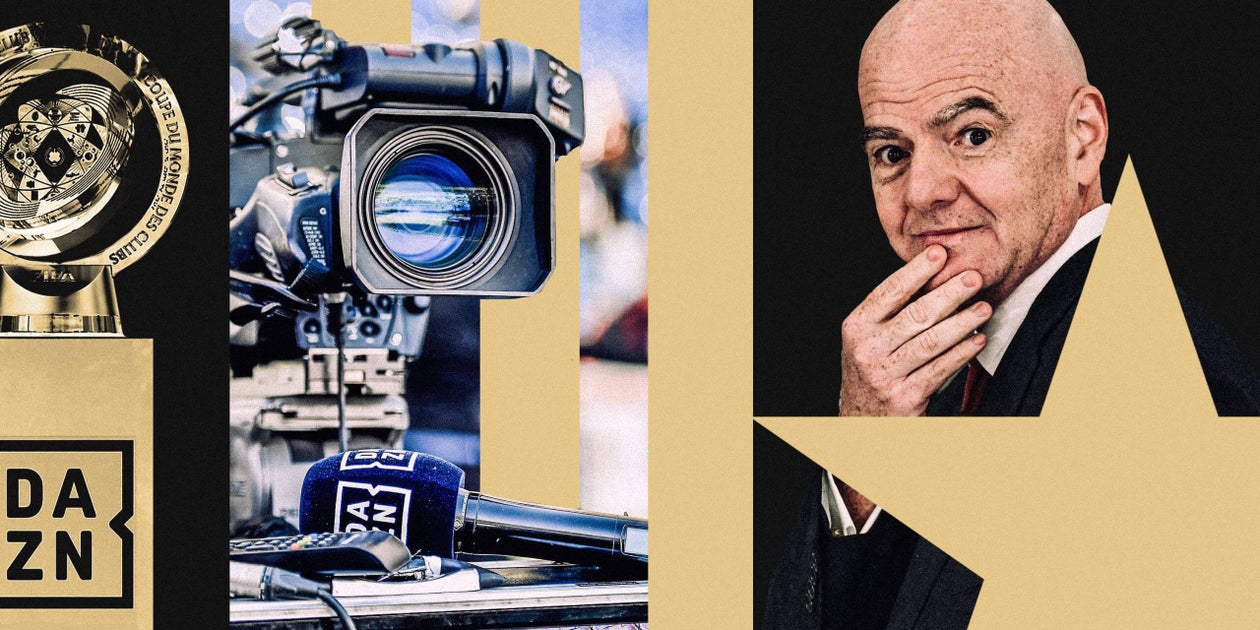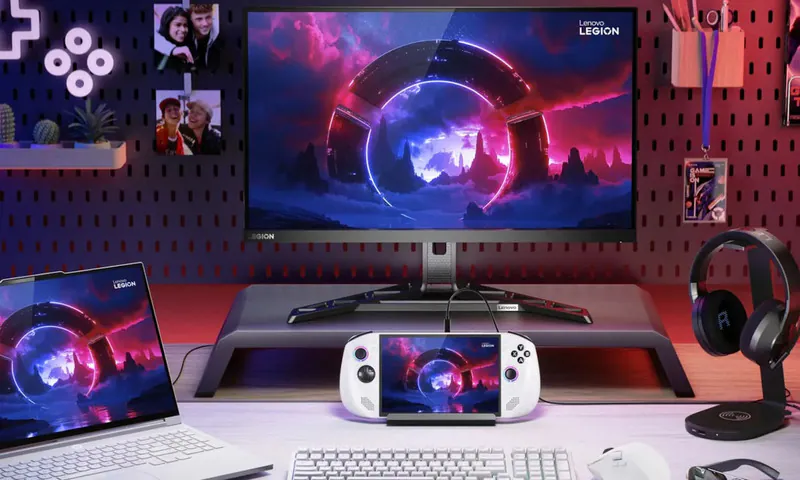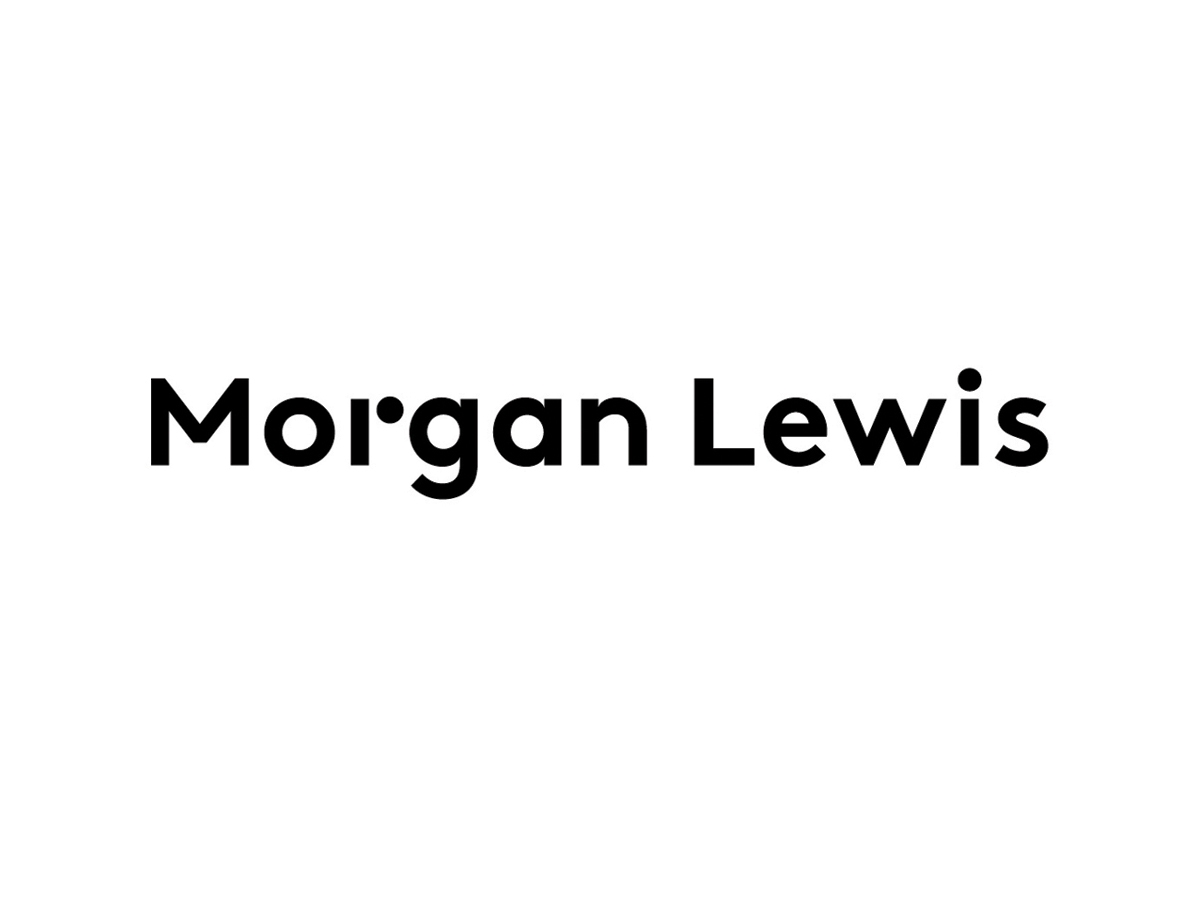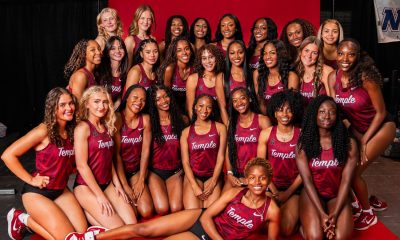Technology
DAZN will broadcast the Club World Cup around the world. What is the streamer’s big idea?

Six months before the planned start of the Club World Cup came word that FIFA had finally found the grease to make its new wheels turn. A global broadcast partner had been secured and in its hands was the billion dollars that could be repurposed as a prize pot to demand the attention of the 32 competing teams.
FIFA called it a “landmark agreement”, the first of its kind. All 63 games in its expanded now-summer club competition would be made available free, with the body’s president Gianni Infantino calling it the “most widely accessible club football tournament ever”.
The partner selected to make it all happen, though, raised eyebrows.
DAZN might consider itself the only global sports streaming platform, dubbed the ‘Netflix of Sport’, but it was not a headline name for FIFA to have picked. In the United States and the United Kingdom, where it was founded in 2015, DAZN remains best known for boxing’s big nights and pay-per-view events. In other parts of the world, including South America and Africa, it is unfamiliar to millions.
All that is set to change in what DAZN’s chief executive, Shay Segev, has predicted will be a “transformational” year for the company. New audiences can be targeted and untapped markets explored. Or so goes the justification in giving FIFA $1billion (£736m) to screen a tournament of unknowns that will be over 29 days after it begins this weekend.
“We think it is good value for money,” DAZN’s chief executive of growth markets, Pete Oliver, tells The Athletic at the company’s headquarters in central London.”It’s hard to know how big the Club World Cup will be, but we can see from the data already that it’s not going to be small. It’ll be big, it’s just a question of how big.”

The Club World Cup trophy on display in Los Angeles (Frederic J. Brown/AFP via Getty Images)
DAZN, like FIFA, needs this new competition to work. It is among the biggest plays in its relatively short history as an ambitious broadcaster and a roll of the dice designed to increase its footprint around the globe. It is part broadcast deal, part promotional campaign.
“We don’t see it as a risk, we see it as a very big opportunity,” adds Oliver. “We think it will reposition the company quite significantly worldwide.”
Follow the Club World Cup on The Athletic this summer…
DAZN — it’s pronounced ‘da zone’, for the uninitiated — has been a company of curiosity within the media industry since the platform was formed in 2015 as a product of Perform Group.
Owned and funded by Sir Len Blavatnik’s Access Industries Group, its plans have always been grand, to the point of eventually redesigning the sports broadcast landscape. DAZN does not hide its prediction that live sport will eventually come to viewers through dedicated digital platforms, following trends set by the music industry.
It is why DAZN regards itself primarily as a tech company but, within the industry that it wants to dramatically alter, plenty point to accumulated losses in chasing that vision.
The group’s most recent set of accounts, published in January, detailed funding commitments of $6.7billion from Blavatnik since DAZN’s inception. There was $1.4bn lost in 2023 alone.
The stark balance sheet deficits are a result of continued expansion in the costly world of football. As well as hoovering up domestic rights deals in major European territories, partnering with Serie A in Italy, Bundesliga in Germany and La Liga in Spain, DAZN had been the home of the women’s UEFA Champions League until the arrival of Disney+ into the marketplace last month. Rights costs in 2023 ($3.1billion) exceeded the company’s annual turnover, which had at least grown to $2.9bn.
Blavatnik can wear the losses better than most. The Ukraine-born British-American businessman in control of DAZN had his wealth estimated to be $26.5billion by Forbes this year and is prepared to widen the company’s frontiers.
Three days before Christmas — and a matter of weeks after FIFA announced the Club World Cup deal — DAZN announced it had agreed to buy Australia’s Foxtel Group from Rupert Murdoch’s News Corp for $2.2billion.
It was inward investment, though, that created greater headlines a month later.
SURJ Sports Investment, controlled by Saudi Arabia’s Public Investment Fund (PIF), bought a minority stake, said to be in single digits in terms of percentage, in DAZN for a reported $1billion to strengthen relations between the two.
Rights for LIV Golf, football’s Saudi Pro League and the various sports under the Riyadh Season banner had already been bought by DAZN, but it was the timing of that $1billion investment, the same figure that would go to FIFA for the Club World Cup, that drew scepticism. A financial, mutually beneficial triangle can be drawn without any assistance between FIFA, Saudi Arabia — which was announced in December as host of the 2034 men’s World Cup — and DAZN.
“The Club World Cup deal was done in December, Saudi investment came in February,” explains Oliver, who says negotiations with FIFA spanned between six and nine months. “At the same time, we also bought Foxtel in Australia for $2billion.
“There were various things happening in the group. The Saudi investment was for plans in the MENA (Middle East and North Africa) region, and the Club World Cup was a separate decision reached last year.”

Lionel Messi will play for Inter Miami at the Club World Cup (Carmen Mandato/Getty Images)
Is the cynicism unfair? “I think it is,” he adds. “We’ve got a primary investor, Access Industries, which has funded the business with significantly more money than we’ve had from PIF. Multiple billions. We’ve had $1billion from PIF, but that’s to launch in Saudi.”
FIFA, regardless, was grateful DAZN’s money came when it did. There had long been talk of Apple stepping up to become a streaming partner for the Club World Cup, but there was a reluctance within the industry to back a competition with neither heritage nor guarantees of engagement. Infantino went as far as calling a briefing with global TV executives last September in an attempt to drum up interest.
“The money they’ve had to cough up for the Club World Cup is astonishing,” says Paolo Pescatore, a media and telecoms analyst with over 30 years of experience.
“This is about DAZN putting a marker in the ground and saying, ‘We want the mantle of being the global streamer of sports, and we’re in a position to do it’. They’ll see this as the tournament where they can do it, but, equally, there’s a lot of hope in play here.”
This, too, is a first for FIFA. The men’s World Cup, the governing body’s greatest asset, continues to see rights sold region by region, but a club event lacking the prestige and history of the UEFA Champions League was instead bundled up and sold off as one.
“There was nobody but DAZN, so they made a beautiful story of it with this $1billion to calm the clubs,” says Pierre Maes, a published author on the sale of sport TV rights. “It’s very convenient for FIFA. They sell to a broadcaster, who can broadcast the property in all of the countries but also, the broadcaster can act as an agency and sell the rights on to broadcasters.
“DAZN solved a big headache for FIFA, but this property has a lot to prove. This feels to me like an opportunity for DAZN rather than a big strategic move.”
DAZN has hedged its bets and opted against going it alone at the Club World Cup. Baked into the agreement with FIFA was the power to sublicense to regional markets, clawing back some of the initial investment. Deals have been struck with TNT in the U.S. and Channel 5 in the UK, ensuring a sizeable chunk of coverage will be shared with others. Channel 5, for example, will show the final and at least one semi-final among its broadcasts of the tournament.
Oliver says “hundreds of millions (of dollars)” have been recouped in that sublicensing process. “That brings in revenue but also helps promote the tournament,” he says.
Sluggish ticket sales in the U.S. would indicate promotion might be needed, but DAZN maintains that interest will not need to be manufactured. It sees the plot lines developing around Real Madrid, who will be led by new coach Xabi Alonso for the first time and include Trent Alexander-Arnold in their ranks, and the fiercely-supported clubs taking part, including Egypt’s Al Ahly and the Argentine pairing of River Plate and Boca Juniors.
“We think the audiences for this will be very big — tens of millions, if not hundreds of millions,” says Oliver. “We think over 100 million people will watch the Club World Cup, and we believe we can drive a lot of ad revenue. You’ll see big sponsors and big advertisers on the feeds worldwide.”
All 63 games of the Club World Cup will be available through DAZN’s app, which is free to anyone who enters an email address and becomes a registered user. Paid subscribers (£24.99 a month in the UK, $19.99 in the U.S.) will see an uplift on their coverage, with improved picture and sound quality, while part of FIFA’s arrangement is the incorporation of the body’s in-house FIFA+ platform and all the content that it offers.
A nagging question is DAZN’s ability to cope with a new scale of demand on its platform this summer.
Major problems were encountered during the screening of Serie A games in 2021 and 2022, with viewers seeing feeds buffer and cut out. That brought criticisms from the Italian government and apologies from DAZN, which has not been alone in finding streaming issues for the most in-demand events. Netflix’s broadcast of the Jake Paul versus Mike Tyson exhibition boxing match in November was overshadowed by technical problems during the 65million concurrent streams. DAZN, though, has confidence in its platform bearing the weight of its biggest numbers.
“We’ve built a new version of our platform specifically for the Club World Cup for free customers, and we’ve simulated 300million people watching at the same time,” says Oliver.
“We’ve made big investments in infrastructure to be ready for this. You never say never in the world of technology but we’re pretty confident. We’ve built the platform, but also we’re providing commentary in 17 different languages, because we’re doing it globally. It’s on a scale that no one else in sport has done before.”
DAZN is nothing if not aspirational. In a company update from this January, Segev promised that DAZN was “only getting started” and that “ambitions are bigger than ever” in 2025. Forecast revenues have been set at $6billion for this year, doubling from 2023.
Then there is the long-term target, said out loud, to reach a billion global users within the next decade — or, put another way, one in every eight people currently on the planet using DAZN on some level. Spotify, for some context, says it has close to 600million users.
It is the scale of DAZN’s plans, coupled with the heavy ongoing losses subsidised by Blavatnik, that is known to evoke the rolling of eyes.

Blavatnik (second left) and his Access Industries group are the majority owners of DAZN (Patrick T Fallon/AFP via Getty Images)
“In our business, we have a lot of people looking at DAZN and asking themselves, ‘What the f*** are they doing?’,” says Maes. “It’s impossible to lose so much money. In the meantime, they are growing into one of the biggest companies in the UK.
“For the people who are trying to sell television rights, DAZN is an opportunity and a danger at the same time. It is an opportunity because in Europe today, it’s the only ambitious sports-rights buyer. It’s as simple as that. They’re the only ones left. But it’s a danger because these people have nearly $7billion of accumulated losses. Their future depends on the will of one man (Blavatnik) to put more money in.”
DAZN is not afraid to admit that football has to be central to its long-term growth. Eighty per cent of the app’s viewing figures, it says, come from showing live matches.
It is why it will remain a domestic partner of Italy’s Serie A until at least 2029 and why it extended its arrangement with Germany’s Bundesliga until the same point. DAZN also struck a five-year deal as a local provider for La Liga matches in Spain in 2022. Less harmonious was the arrangement with France’s Ligue 1, severed inside a year, but other domestic partnerships can be found in Japan and Belgium.
Those territories are where a substantial portion of DAZN’s 20 million paid-for subscribers can be found. The Premier League, except for the rights to televise its games in Spain and Portugal, has eluded it.
Aside from the proposed acquisition of BT Sport in 2022, which would later be sold to Warner Bros Discovery and rebadged as TNT Sport, there has been little prospect of televising Premier League matches in the UK and breaking Sky’s stranglehold. The fifth-tier National League is the only long-standing partner of DAZN in English football.
There are other key properties, including the NFL’s Game Pass app in countries outside the United States, and a raft of boxing shows following link-ups with key promoters Golden Boy, Matchroom and Queensberry. The greatest challenge, however, is attracting and retaining subscribers.
“At the beginning of 2024, DAZN was talking about reaching break-even,” says Francois Godard, senior media analyst of Enders Analysis. “That was the message. And then, this winter, it changed. They kept the message that they are doing better, but the main message was expansion. It shifted from a focus on break-even to a message of expansion.
“There was the deal in Australia and then the deal with the Saudis. That is probably allowing them to do the deal for the Club World Cup, which will allow them to gain prominence in many other markets where they had a lower profile, like the U.S. That was a big change in emphasis.”
So, how significant do the Club World Cup’s global rights become to a project of this scale?
“To them, it’s a publicity operation to reach out to people who have never heard of them,” Godard adds. “They want to become a global platform, which is very tough in sports. The rights are almost always (sold) country by country. The Club World Cup will be free-to-air and it’s a one-off.
“DAZN is a subscription service, so it needs subscribers all year round. But arguably there can be an overlap in terms of reach, and many platforms have a free tier where registration is required. Then it becomes easier to pitch a subscription to these customers.”
That is undeniably part of the long-term strategy. The data of sports fans this summer will have enormous value to DAZN, an intangible byproduct of the $1billion investment. Forging the first links with FIFA will also carry benefits should the Club World Cup broadcast model be successful enough to be scaled-up at an event such as the 2034 World Cup, which is being hosted by, let us not forget, Saudi Arabia.

Saudi Arabia will host the men’s World Cup in 2034 (Abdullah Ahmed/Getty Images for Saudi Arabian Football Federation)
DAZN will hope this is the start of something bigger with FIFA, but the path is not clear of competition. Netflix has already secured global rights for the Women’s World Cup in both 2027 and 2031, and Disney’s poaching of the UEFA Women’s Champions League from DAZN next season illustrates the continued willingness of streaming giants to explore live sport.
DAZN likes to stress it remains the only dedicated global sport platform, and for all the industry reservations, it does not deviate from a strategy that will quicken with this summer’s Club World Cup.
“We’re pretty clear on where we’re going,” says Oliver. “If you take a step back, you can see music has moved to a digital model. The sport industry hasn’t got there yet.
“We’re building a platform for that. We view that as a tech company, like YouTube or Spotify. We’re building a platform.
“If you go forward 10 or 20 years, way more sport will be delivered through a single platform on a global platform. You can see the traditional model in decline. No one else is building a dedicated sports app. We think the end-game is that we become the global home of sport.”
The Club World Cup, for better or for worse, will go a long way to shaping DAZN’s future.
(Top photos: Getty Images; design: Kelsea Petersen)
Technology
Xpoint secures new growth funding to supercharge geolocation innovation for real money gaming

Our website uses cookies, as almost all websites do, to help provide you with the best experience we can.
Cookies are small text files that are placed on your computer or mobile phone when you browse websites.
Our cookies help us:
– Make our website work as you’d expect
– Remember your settings during and between visits
– Offer you free services/content (thanks to advertising)
– Improve the speed/security of the site
– Allow you to share pages with social networks like Facebook
– Continuously improve our website for you
– Make our marketing more efficient (ultimately helping us to offer the service we do at the price we do)
We do not use cookies to:
– Collect any personally identifiable information (without your express permission)
– Collect any sensitive information (without your express permission)
– Pass personally identifiable data to third parties
– Pay sales commissions
Technology
HDMI Gaming Technology Lines : HDMI Licensing Administrator
At CES 2026, visitors to the HDMI Licensing Administrator’s booth can witness prototypes of the Ultra96 HDMI Cable, which was “introduced in the recently released HDMI 2.2 Specification,” alongside the Ultra High Speed HDMI Cable and the Premium High Speed HDMI Cable. The organization will highlight the high-refresh performance rate of its products, as well as their compatibility with popular portable gaming consoles and retro-style gaming systems. Supportive features like variable refresh rate and auto low latency mode will be highlighted, as well.
Technology
Expandable eSports Laptop Models : Lenovo Legion Pro Rollable

The Lenovo Legion Pro Rollable laptop will reportedly be based on the brand’s Legion Pro 7i platform with an Intel Core Ultra processor and NVIDIA GeForce RTX 5090 GPU. The additional tech specs for the laptop are yet to be announced.
Image Credit: Lenovo
Technology
Driving Digital Innovation: Sultan Almasoud on the Top Trends in Technology and Esports in Saudi Arabia | Morgan Lewis – Tech & Sourcing

Dr. Sultan Almasoud, managing partner of Morgan Lewis’s Riyadh office, has been closely involved in the Kingdom of Saudi Arabia’s rapid evolution into a global hub for innovation. His insights on the questions below shed light on the trends reshaping technology and esports—and the opportunities they unlock for investors and operators entering the market.
Q&A: SULTAN ALMASOUD
1. What are the most significant technology trends currently driving growth in Saudi Arabia?
Saudi Arabia is undergoing one of the most ambitious digital transformation journeys in the world. The most significant trend is the rapid adoption of AI across government, financial services, healthcare, and industrial sectors. Vision 2030 has accelerated investment in AI-ready infrastructure, digital identity, automation, and data platforms that support new digital services at scale.
We also are seeing strong momentum in cloud migration, driven by hyperscaler expansions, data localization policies, and new solutions that make it easier for public and private entities to adopt cloud-native technologies. In parallel, fintech innovation, digital payments, and open banking are creating a dynamic ecosystem of startups, investors, and regulators working together to modernize the financial landscape.
In addition, Saudi Arabia’s giga projects are acting as large-scale accelerators for advanced technologies, while strong regulatory frameworks around data, cloud, and cybersecurity are providing international investors with clarity and confidence. Combined with significant investment in digital talent and localization, this is enabling sustainable, long-term technology-driven growth across the Kingdom.
2. How is Saudi Arabia positioning itself as a global hub for esports?
Saudi Arabia has made esports a national priority, fundamentally reshaping the sector. The launch of the Saudi Esports Federation (SEF) and the Esports World Cup, supported by major public investment commitments, has placed the Kingdom at the center of global competitive gaming.
But the strategy extends beyond events. The country is developing training academies, production studios, esports arenas, and digital platforms that sustain year-round player and audience engagement. This ecosystem-driven approach is drawing global publishers, teams, and content creators who now view Saudi Arabia as a foundational market for long-term esports growth.
3. What opportunities do you see emerging for investors and companies entering the Saudi tech and esports market?
There is tremendous opportunity at the intersection of technology, entertainment, and digital infrastructure. For technology companies, opportunities are especially strong in AI solutions, cybersecurity, cloud services, digital identity, and smart city platforms.
In esports, the most compelling opportunities lie in content creation, talent development, gaming studios, tournament production, and technologies supporting broadcasting, analytics, and community engagement. Investors who understand the regulatory environment and align with the Kingdom’s long-term vision will find a market eager for strategic partnerships.
4. What challenges should companies keep in mind when operating in these fast-evolving sectors?
These sectors are evolving quickly, which makes regulatory navigation an important challenge. Companies need to stay aligned with requirements around licensing, content regulation, data protection, and foreign investment—areas that are developing alongside the industry itself.
Another key challenge is specialized talent. Whether it’s game design, AI engineering, or esports event management, building local capability is essential. Companies that invest early in training programs, knowledge transfer, and local partnerships will be best positioned for sustainable growth.
Ultimately, success requires a long-term commitment to the market, strong local relationships, and an understanding of national priorities as the Kingdom advances its digital transformation goals.
KEY TAKEAWAYS
Saudi Arabia is positioning itself at the forefront of global innovation, with technology and esports playing central roles in the nation’s economic transformation. As investment accelerates and new digital ecosystems emerge, companies that build strategic partnerships and engage deeply with local priorities will be poised to lead.
Technology
Fast Switches, RGB Customization, and Next-Gen Gaming Precision

Mechanical keyboard 2026models integrate ultra-fast switches that achieve 0.1ms actuation with under 1mm travel, allowing competitive gamers to press keys 20% faster in FPS and MOBA titles. RGB keyboards now feature 16.8 million per-key zones, enabling dynamic lighting that reacts to game events, killstreaks, or ability cooldowns. Hall-effect magnetic switches dominate the premium segment, offering adjustable actuation points from 0.1mm to 4.0mm while lasting 100 million keypresses with no physical wear. Together, these innovations deliver both tactile precision and immersive customization, making mechanical keyboards a vital tool for high-level competitive play.
Mechanical keyboard 2026 designs also focus on durability, ergonomics, and modularity. Hot-swappable switches allow players to fine-tune the feel without soldering. Aluminum chassis and gasket-mounted plates reduce finger fatigue while maintaining solid stability for marathon gaming sessions. Modern firmware supports thousands of macros, rapid polling rates, and dual-PC setups, ensuring that esports players experience consistent input across multiple platforms.
Fast Switches and Key Feel
Fast switches like Gateron KS-20 reduce actuation force to 35g at just 0.2mm depth, while optical variants eliminate debounce delays, registering inputs at 8,000Hz natively. Mechanical keyboard 2026 boards include hot-swappable sockets, allowing players to swap magnetic, linear, or tactile stems without soldering. PBT double-shot keycaps resist shine after five years of heavy use, and gasket-mounted designs reduce bottom-out impact, lowering finger fatigue by up to 30% during marathon sessions. Combined, these features enhance responsiveness, durability, and ergonomic comfort for both competitive and casual gamers.
Other innovations include per-key actuation calibration via onboard OLED displays, letting players fine-tune each switch’s sensitivity individually. Fast switches allow remapping for advanced trigger modes, such as assigning jump or crouch to rapid keypresses, boosting movement efficiency in FPS titles. Firmware support like VIA and QMK provides up to 1,000 macro layers, ensuring fluid execution of complex combos. NKRO (N-Key Rollover) maintains accurate detection of 100 simultaneous inputs, preventing ghosting during intense gameplay.
RGB Keyboards and Lighting Customization
RGB Gaming keyboards in 2026 employ addressable LEDs beneath every key, responding instantly to in-game actions, music beats, or voice chat activity. Fast switches synchronize with lighting effects to create visual feedback for ability activation or kill confirmations. VIA and QMK support advanced lighting macros across 16.8 million colors, letting players design immersive themes and reactive effects. RGB keyboards also integrate USB passthrough hubs, enabling controller charging or peripheral connections without latency interruptions.
Premium gaming screens emphasize both aesthetic and functional benefits. Aluminum chassis with acoustic foam layers tune sound profiles from soft, creamy thocks to sharp, clicky clacks, complementing per-key lighting for sensory immersion. RGB keyboards combined with modular keycaps allow instant visual recognition of critical keys, enhancing reaction times in high-pressure matches. Firmware updates maintain compatibility with new software and games, ensuring that RGB functionality evolves alongside gaming trends.
Build Quality and Advanced Features
Mechanical keyboard 2026 models focus on robust materials and ergonomic design to support competitive play. Aluminum top plates weigh around 1.2kg, stabilizing 60% or full-size layouts, while foam and gasket mounting reduce vibration and noise. Fast switches with Hall-effect sensors allow precise calibration and onboard memory, storing personalized actuation and lighting settings.
Other features include multi-device support, 8,000Hz polling across dual-PC setups, and modular layouts for hybrid gaming and productivity. High-end models provide long-term durability, with switches rated for 100 million keypresses and chassis built to withstand sustained pressure. These designs ensure that both casual players and esports professionals can maintain peak performance over years of intense use.
Key Features:
- Aluminum top plates provide stability and long-lasting structural integrity.
- Foam and gasket-mounted designs reduce vibration, noise, and finger fatigue.
- Hall-effect fast switches allow precise per-key calibration and storage.
- Modular layouts and multi-device support enhance versatility for gaming and work.
- 8,000Hz polling ensures sub-ms latency across dual-PC or multi-system setups.
- Switches rated for 100 million keypresses guarantee long-term durability.
Conclusion
Mechanical keyboard 2026 models with fast switches and RGB keyboards redefine both competitive precision and immersive gameplay experiences. Adjustable actuation, ultra-fast response times, and reactive per-key lighting provide measurable advantages in esports, allowing players to execute rapid combos and maintain visual awareness under intense pressure. Durable materials, modular layouts, and advanced firmware ensure 10+ years of relevance, keeping performance consistent even as switch technology evolves. Combined, these innovations set a new benchmark for gaming keyboards, making them an indispensable tool for casual enthusiasts and professional gamers alike.
Frequently Asked Questions
1. What makes mechanical keyboard 2026 switches faster than older models?
Mechanical keyboard 2026 switches achieve 0.1ms actuation with minimal travel, reducing input delay. Optical switches eliminate debounce entirely. Hot-swappable designs allow users to optimize each switch type. Together, they improve reaction times in competitive gaming.
2. How do RGB keyboards enhance gaming performance?
RGB keyboards provide per-key lighting for instant visual cues on ability cooldowns, killstreaks, or critical keys. Reactive effects improve reaction speed in high-pressure scenarios. Custom macros allow lighting to indicate complex input sequences. This combination merges aesthetics with functional gameplay advantages.
3. Are fast switches durable enough for long-term use?
Yes, Hall-effect and magnetic switches are rated for 100 million keypresses. Gasket-mounted designs reduce mechanical wear and finger fatigue. PBT double-shot keycaps resist shine and degradation. Long-term durability ensures consistent performance for years.
4. Can mechanical keyboard 2026 models support multi-device setups?
Many models integrate USB passthrough hubs for peripherals and dual-PC support. 8,000Hz polling ensures sub-ms latency across connected devices. Firmware allows separate profiles per device. This setup guarantees smooth operation for both gaming and productivity tasks.
Technology
How Schools Are Powering the Future of Competitive Gaming Education

The world of esports has rapidly shifted from a niche form of entertainment to a central component of competitive gaming education. As 2026 approaches, academic institutions across the globe are embracing the opportunities that digital competition presents.
From high school classrooms to university campuses, structured gaming programs in schools are transforming how students learn, collaborate, and prepare for the digital economy.
The Explosive Rise of Esports in Education
Esports, once dismissed as mere gaming, now attracts millions of players and spectators around the world. Educational institutions have taken notice. The steady growth in digital engagement, streaming culture, and student interest has pushed schools to formally integrate esports into their extracurricular and academic offerings.
By 2026, experts project that school-based esports participation will surpass that of traditional high school sports in some regions. The digitization of competitive gaming aligns with broader trends in modern education, where technology, inclusivity, and creativity intersect to form new learning pathways.
What Is Esports and Why Is It So Popular Among Students?
Esports refers to organized, competitive video gaming, often involving professional players and teams. Unlike casual gaming, esports involves structured tournaments, ranked leagues, and strategy-based team play across popular titles such as League of Legends, Valorant, and Rocket League.
For students, esports blends entertainment with purpose. It enables individuals who may not participate in traditional athletics to compete, build communities, and express creativity. The widespread availability of gaming hardware, streaming tools, and online platforms has lowered the entry barrier, making esports more accessible than ever.
Moreover, the social component is powerful. Online tournaments and school leagues foster connection across diverse backgrounds, helping students develop coordination, leadership, and interpersonal skills, traits that are increasingly valuable in both academic and corporate environments.
How Are Schools Launching Esports Programs?
Many schools have already launched formal esports programs, driven by student demand and institutional recognition of esports’ educational potential. Universities in the United States, South Korea, and the Philippines are establishing dedicated esports departments that oversee teams, manage scholarships, and organize intercollegiate competitions.
High schools are following suit. Some districts are converting computer labs into esports arenas equipped with high-performance PCs, ergonomic setups, and broadcast equipment. Others collaborate with gaming companies to create mentorship and training initiatives, blending classroom theory with real-world competition.
These gaming programs in schools go beyond playing. They involve curriculum design, technical training, and content creation workshops that align esports with the broader educational framework. Students learn not only how to compete but also how to analyze performance data, manage teams, and produce digital media.
What Do Students Learn from Competitive Gaming Education?
The rise of competitive gaming education is reshaping the skillsets associated with modern learning. Students gain more than just gaming proficiency, they develop critical thinking, multitasking, and collaboration abilities. These programs emphasize transferrable skills such as problem-solving, adaptability, and emotional regulation under pressure.
Esports also complements existing curricular areas. Game strategy mirrors elements of mathematics and physics, while coding and hardware management connect directly to STEM learning. Instructors use esports to teach topics such as network infrastructure, software development, and game design.
Beyond academics, competitive gaming encourages inclusivity. Students of all genders, backgrounds, and physical abilities can participate on equal footing, fostering school pride and teamwork in digital spaces.
How Big Will Esports Be by 2026?
Industry analysts predict that esports in 2026 will be valued at over $2 billion globally, with an audience exceeding 800 million. This rapid growth is fueled by live-streaming platforms, increasing sponsorship deals, and more educational integration.
Esports’ reach continues to expand beyond traditional entertainment. Virtual reality and augmented reality are enhancing gameplay engagement, while blockchain-based tournament systems are adding transparency to competition and prize distribution.
The integration of AI analytics is also reshaping coaching methods. Educators and team managers are using data-driven insights to assess player performance, optimize team composition, and develop customized training regimens. As schools adopt these same analytical tools, competitive gaming education enters a new era, where digital literacy and innovation drive progress.
What Challenges Do Schools Face in Running Esports Programs?
Despite the enthusiasm surrounding esports, schools still face practical and ethical challenges. One major concern is balancing academics with gaming commitments. Without structured supervision, students may risk excessive screen time or burnout.
Institutions are addressing this by introducing strict schedules, physical activity requirements, and mental health counseling. Another challenge involves funding. Setting up professional-grade arenas and securing reliable hardware demand significant investment. Public schools in particular rely on sponsors or partnerships with tech firms to maintain program sustainability.
Finally, schools must train or hire qualified esports coaches who understand both the educational context and the competitive scene. This dual expertise ensures that gaming remains an avenue for learning, not just recreation.
Success Stories: Schools Leading the Way in Esports Education
Several schools around the world have already demonstrated how esports can enhance education. In the United States, the High School Esports League (HSEL) connects thousands of students nationwide, fostering academic engagement and teamwork. Schools such as Miami University and the University of Utah became early adopters of varsity esports teams, setting benchmarks for collegiate competition.
In Asia, South Korea remains a trailblazer. Its government has integrated esports into youth programs, emphasizing both technical training and player well-being. Meanwhile, in the Philippines, some universities have begun offering esports courses as part of information technology programs, mirroring global trends toward curriculum innovation.
These examples prove that when implemented responsibly, esports programs can increase student enrollment, improve school visibility, and create bridges between education and industry.
The Future of Competitive Gaming Education Beyond 2026
Beyond esports 2026, the intersection of competitive gaming and education will likely deepen. Analysts foresee a future where esports becomes as normalized as traditional athletics, with intramurals, leagues, and international tournaments structured at school and university levels.
The global shift toward online learning has also paved the way for hybrid esports education models, combining remote play with in-person coaching. Additionally, certifications in health and psychology related to esports are expected to emerge, helping educators manage player wellness and team dynamics effectively.
Cross-border collaborations may soon unite students from different regions in global esports competitions, promoting cultural exchange and digital diplomacy through gameplay.
Frequently Asked Questions
1. Can esports help improve students’ academic performance?
Yes. Organized esports can boost focus, strategic thinking, and time management. Students in competitive gaming education often show stronger problem-solving and teamwork skills that support academic success.
2. What are the career opportunities for students who study esports?
Students can pursue careers in event management, broadcasting, analytics, marketing, and game design. Many esports 2026 programs also prepare graduates for tech and media-related fields.
3. How do schools choose which games to include in their esports programs?
Schools select games that promote teamwork, critical thinking, and inclusivity. Titles like Rocket League and League of Legends are common in gaming programs in schools due to their balance of strategy and accessibility.
4. Do esports programs promote diversity and inclusion in education?
Yes. Esports welcomes students from all backgrounds, offering equal opportunities regardless of physical ability or gender. Many schools use competitive gaming education to foster inclusivity and community.
-

 Motorsports2 weeks ago
Motorsports2 weeks agoSoundGear Named Entitlement Sponsor of Spears CARS Tour Southwest Opener
-

 Rec Sports3 weeks ago
Rec Sports3 weeks agoBlack Bear Revises Recording Policies After Rulebook Language Surfaces via Lever
-

 Motorsports2 weeks ago
Motorsports2 weeks agoDonny Schatz finds new home for 2026, inks full-time deal with CJB Motorsports – InForum
-

 Rec Sports2 weeks ago
Rec Sports2 weeks agoHow Donald Trump became FIFA’s ‘soccer president’ long before World Cup draw
-

 Rec Sports2 weeks ago
Rec Sports2 weeks agoDavid Blitzer, Harris Blitzer Sports & Entertainment
-

 Motorsports2 weeks ago
Motorsports2 weeks agoJR Motorsports Confirms Death Of NASCAR Veteran Michael Annett At Age 39
-
Sports2 weeks ago
Elliot and Thuotte Highlight Men’s Indoor Track and Field Season Opener
-

 Motorsports2 weeks ago
Motorsports2 weeks agoRick Ware Racing switching to Chevrolet for 2026
-
Sports2 weeks ago
West Fargo volleyball coach Kelsey Titus resigns after four seasons – InForum
-

 Sports2 weeks ago
Sports2 weeks agoTemple Begins Indoor Track & Field Season at UPenn This Weekend

































